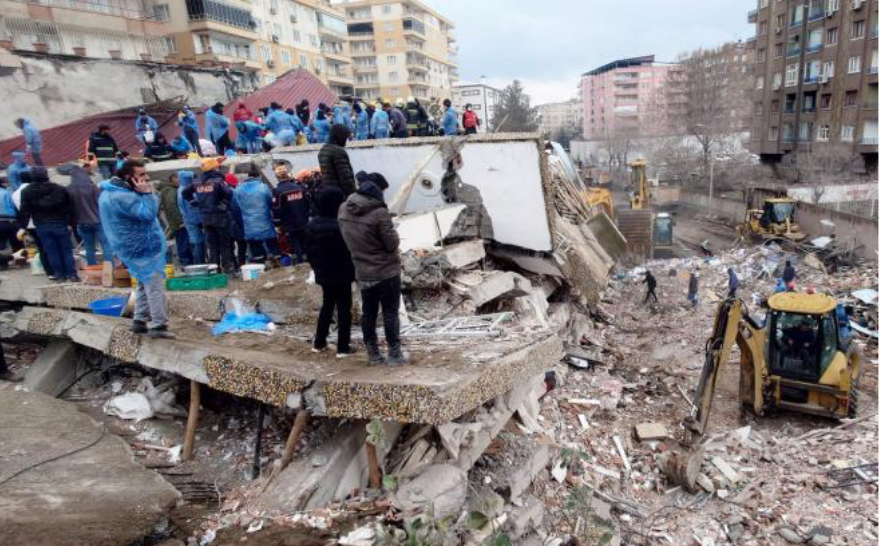Earthquake strikes Turkey and Syria killing over 50,000
The devastation of the earthquakes worsened by politics
Rescue searches conducted through rubble of buildings downed by deadly earthquake in Turkey and Syria
February 28, 2023
The death toll continues to rise in Turkey and Syria after deadly earthquakes hit their regions, beginning on Feb. 6. The 7.8 magnitude earthquake was followed by a 7.5 magnitude aftershock only a few hours later. As the month progressed through continuous searches and devastation, a 6.3 magnitude earthquake followed in the same region on Feb. 20.
At the time of publication, the death toll in Turkey and Syria has surpassed 50,000. According to the latest figures from Turkey’s Disaster and Emergency Management Authority (AFAD), 44,218 people have died in Turkey and 5,914 in Syria.
The infrastructures that toppled due to the earthquake trapped thousands under the rubble who are still being rescued and also left many homeless. Families have begun staying in tents and sleeping in their cars due to the fear of another earthquake. The thousands of people displaced from their homes are only an addition to the thousands more that have been displaced by the war in the region.
The earthquake has brought scrutiny to the Middle East from many different angles, from politically to religiously.
There have been criticisms regarding the state of the collapsed buildings and the governments’ responses to the earthquake. President of Turkey Recep Tayyip Erdogan has been blamed for the late response in getting aid into the devastated areas by saying more people could have been saved with a more timely response and that he lacked providing support for survivors.
In Turkey, the government investigated more than 550 people and issued warrants for more than 100 people for their responsibility in the poor construction of the buildings. The Turkish Justice Ministry has ordered officials to set up “Earthquake Crimes Investigation Units” to charge the construction workers with criminal charges of failing to meet codes that were set in place after a previous disaster in 1999.
Multiple legal actions have been taken in identifying and charging people who may have contributed to the deaths of those from collapsed buildings. Residents have criticized builders and contractors who failed to follow safety codes in order to increase their profits. This criticism also falls on the government, which has been granting “amnesties” to the builders who did so.
These buildings are not only old buildings in the region but newly built ones, like a luxury 14-story building that housed around 90 apartments that collapsed during the earthquake. These charges have been presented as involuntary manslaughter and violation of public construction law. Constructors have been fighting back by stating that their buildings have been licensed and audited by local and state authorities.
The government’s response to the earthquake has been criticized as slow, and residents’ worries continue to build about their own safety and well-being in a country where inflation passed 80% last year. In addition to the devastating impacts of the earthquake, Syria continues to struggle, as they have been mostly cut off from outside aid due to political issues from their 12-year civil war.
Humanitarian aid has been consistently politicized throughout those years and continues to be so even through this crisis. As the United Nations Security Council attempts to send aid to Syria, it has been stopped in Russia by the refusal of allowing other crossing points to function because of Russia’s support for President of Syria Bashar al-Assad. President. al-Assad wants aid to come through the central government, while Western aid agencies want to deliver it directly to Syria’s northwest.
Even with the death toll continuously rising, there seems to be a disorganized effort for aid because of politics. The situation is increasingly becoming more devastating for the country and its residents, and the focus should be for them to receive access and resources to soothe the disaster as much as possible.
The rebuilding of the countries is difficult when considering the other issues that they face. With sanctions, economical issues and a collapsing currency, the response to the earthquake only becomes harder. The international community needs to rise to fulfill its responsibility for aid and emergency measures to prevent further issues from arising.
The international response has been mostly positive in supporting Turkey and Syria with an exception of the Islamophobia that remains in the Western world. While social media and the progression of society have improved how the Western world views the Middle East, Eastern countries still face attacks due to religion.
Though the Turkey-Syria earthquakes have devastated the countries to an immeasurable amount and people continue to encourage aid and hope for a positive future for the countries, some people do not seem to agree with them on the basis of their Islamaphobic view.
Two mosques in London have been targeted and received Islamaphobic letters. The letter was titled “To all worshippers of the make-believe religion of Islam.”
“This heartfelt letter is to express my sincerest sorrow about the events in Turkey and Syria,” one letter read. “However I wish to make it clear that it is not heartfelt sorrow I feel that thousands of people died. I am only sincerely sorry that more Muslims didn’t die.”
The letter continues to wish for more deaths from the earthquakes.
“There should have been at least 2 million dead, at the very minimum,” it said. “I could not stop smiling watching people being pulled from the rubble, thankfully some dead, sadly some still alive. I really hope that the recent earthquake will be one of many more to come.”
The letter follows by slandering Islam with non-factual statements and stereotypes that have followed Muslims for years. The writer of the letter hopes for more suffering for Muslims and does not believe that Islamophobia is real.
The mosque community had personal connections to people that died in the earthquake. The mosques filed reports but inquiries are still ongoing and there have been no arrests, according to the police.
There continues to be growing anger in how the residents of Turkey and Syria have been treated with the corrupt infrastructure practices and the Islamaphobic commentary from the international community. The devastation is not just limited to the physical tragedy but also the politics that surround the countries.




